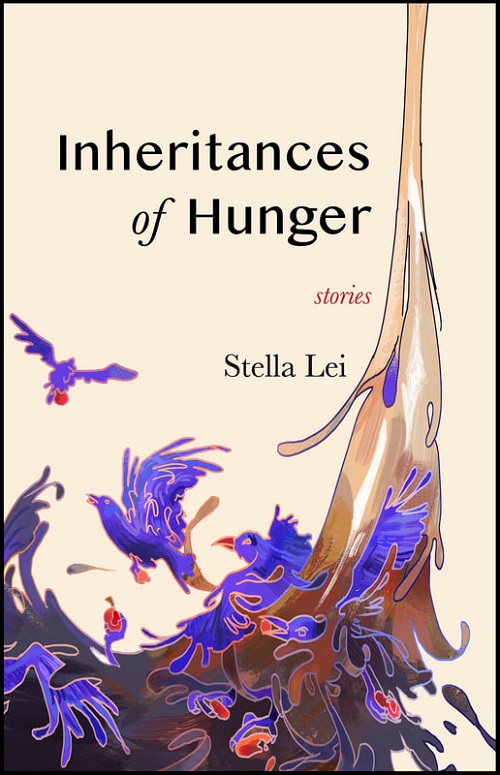
Secrets serve as our guides to navigate the world of Stella Lei’s first chapbook, Inheritances of Hunger.
But secrets are only granted once one has proven themselves to be worthy of Lei’s trust—do we know how to hold her narrators’ hurt, to engage with it as if our own? Masochism and sacrifice form the foundations of these stories, showing us how often the knives we turn toward ourselves serve a dual purpose in helping us relate to others, specifically, those we feel can understand our pain. In “Games,” two girls engage in competitions of who can withstand the most suffering. “So we turned ourselves into bait—stood still as mosquitos alighted on our arms and siphoned our blood; squashed them as they dispersed—our skin a sacrifice for another tally, for the chance to say I win.”
Winning comes with a price, however, in that it reveals to us the truth. In “Changeling,” the narrator flips through a book of 1000 Fun and Unbelievable Facts with her sister, but they are quick to recognize themselves as voyeurs: “How morbid, we say of the book designers, to make an animal admit to its own crime,” they say after learning that goldfish eat each other under extreme stress. We immediately then cut to the next section where the narrator aids her mother in burying her sister, turned cannibal by a terrible disease. “Do you think she knew us? When we killed her?” asks the narrator, but she receives no reply.
Bodies may disappear, and yet hunger still remains long after death. Who first taught us of the surety of our fates, that we have no choice but to resign ourselves to bearing the weight of this knowledge? Lei trusts us by now to let us in on the secret—they are are none other than the women who gave birth to us.
So far, mother has been seen as nothing but a self-absorbed sadist, someone who is not only capable but perhaps craves to kill, but Lei raises yet another question: is our mother not also a victim? “That evening, when I asked about dinner, she told me if I went long enough without food, I could shrink my stomach into a fist. Exorcise the years from my body, leave only purity. Bone. Calcium scaffolding my shins like pillars of salt,” Lei writes in “On Building A Nest.” This question continues to echo, a trembling note without sound, in our second to last story, “Graftings”. Mother, so full of pain, is clearer than ever as she offers us the only thing she can: she allows us to watch her as we die. “Even though I didn’t have to, I often stayed to watch my mother eat. She swallowed quickly, endlessly, left arm curled serpentine around her stomach. Like it was holding every vegetable and grain of rice inside.”
With only five stories in Lei’s chapbook, we are, like these characters, left wanting more. We believe that if only we can continue cutting the pieces of our fragmented understandings of reality into smaller pieces, eventually, we will be our own masters. And yet we come to realize that the fragments themselves contain the truth: We love our mother as much as we may believe ourselves to hate her. We are horrified of her as we are horrified by our inability to save her. We want to be saved as much as want to be left splintered. Lei imparts us with a final act of trust in “Meals for the End of the World,” allowing us to share in her ability to finally sit down and eat not only one full serving of food, but two: “I fit her breath to mine this last time, hear it rattle as her bones make my body home, our moths merging into one. I part my lips to the fractured sky. Now, I can swallow for two.” Each word that Lei writes is sharp, intentional, a lyric counter to the apathy and cruelty we see displayed throughout. Our last lesson: Hope, while perhaps still as unsteady as we are in our flight, can carry us forward. At only 18, Stella Lei is a remarkable teacher, and I am looking forward to what we will learn from her in the future.
Inheritances of Hunger, by Stella Lei. Syracuse, New York: River Glass Books, April 2022. $10.00, chapbook.
Daisuke Shen is a writer originally from Kitahiroshima, Japan, and Greenville, South Carolina. You can visit their website at daisukeshen.com.
Check out HFR’s book catalog, publicity list, submission manager, and buy merch from our Spring store. Follow us on Instagram and YouTube. Disclosure: HFR is an affiliate of Bookshop.org and we will earn a commission if you click through and make a purchase. Sales from Bookshop.org help support independent bookstores and small presses.
